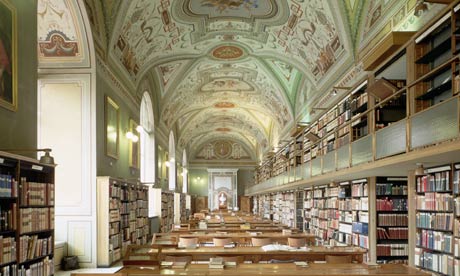WRITTEN CHARM

As technology becomes increasingly available and digital information expands on a daily basis, academic library use is on the decline or so you would assume.
Research libraries in colleges and university campuses are finding that gate counts and circulation of traditional materials are falling at many libraries across the country, as students find new study spaces in dorm rooms or apartments, coffee shops, or nearby bookstores. When all the information is available on mobile phones nowadays and news can be accessed with the click of a button, it looks like the humongous libraries are on way to becoming museums.
But librarians who work in these places have a different take in this regard. According to them, libraries will never die out as they have their own charm. “The very concept of a library cannot end. It has a certain environment attached to it. Logo ko ek prakar ka anand milta hai yaha aake padhne me,” says Sudha Mukherjee, librarian at Delhi Public Library, H-Block, Sarojini Nagar.
“Real readers look for satisfaction when they read a book and only a library can satisfy a reader. Online libraries can never be an alternative for physical libraries,” she further adds.
The shift to electronic resources has many scholars and librarians worrying about the loss of a central community resource in physical libraries, whether they are at the university or public level. University boards are becoming increasingly skeptical about new additions and library buildings, since they cost so much.
Many academics mourn the loss of a common culture of library use across campuses and communities while others hail the era of a new type of library with a new structure of knowledge and practical use. There has been a move to make the library seem more than a tool and storage house for books and information as different programmes are offered and coffee bars are added. This is a huge transition.
Another librarian Vandana Kamal Vanshi of National Archives, seconds Sudha and says, “Physical libraries are not losing their charm at all. Reading inside a library gives one a different feel all together. It cannot be compared with online libraries that are becoming increasingly available. They cannot give you the variety of reading as compared to the traditional ones.
“One can have the access to each and every book available in a library but online, it is not possible for one to search all books at one time.”
With the rapid expansion of the internet to the general public, people are seeking answers in the quickest and most convenient way. While physical use may have been reasonably expected to decline in recent years due to the large scale shift to digital libraries and the increase in sources such as e-journals, the trend has appeared to be on a much larger scale.
An avid lover of books, Reshmi Sharma, a media professional cannot read anything online and only find satisfaction in reading an actual book. “I need to have the feel of a book. I cannot read online. I just do not get the feeling while reading something online.”
Going by the trend, the traditional library is here to stay though there is no denying that more and more libraries are increasingly digitising records and putting books for their readers. After all, the smell of a ‘real’ book can only be enjoyed by the bookworm.
